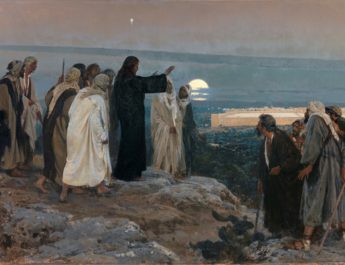John 3:14-21
Fourth Sunday in Lent B
14 And just as MosesA lifted upB the serpentC in the wilderness,D so mustE the Son of ManF be lifted up,
A “Moses” = Mouses. From Hebrew Mosheh (Moses); from mashah (to pull out in a literal or figurative sense, to draw out) OR from Egyptian mes or mesu (child, son i.e. child of…). This is Moses – the one drawn out from the water, which is to say, rescued. If derived from the Egyptian, his name would share a root with Rameses and Thutmose.
B “lifted up” = hupsoo. From hupsos (height, high position, heaven, dignity, eminence; elevation, altitude; to be exalted); from hupsi (on high, aloft); from huper (over, above, beyond). This is to elevate in a literal or figurative sense. So it could be to raise up or set something in a high place or to exalt or make something great.
C “serpent” = ophis. 14x in NT. Perhaps from optanomai (to be seen, to gaze at something with eyes wide open, to see something remarkable). This is snake or serpent, often used of the devil. It is the snake as a type that is sly or cunning – someone malicious.
D “wilderness” = eremos. Properly, a place that is not settled or farmed, not populated. It could be a deserted area or a desert place. It could be seen as secluded, solitary, or lonesome. Any kind of vegetation is sparse, but so are people generally.
E “must” = dei. From deo (to tie, bind, compel; declare unlawful). This is what is necessary or proper. It is what is needed or what one should do – a duty or something inevitable. This refers to something absolutely necessary.
F “Man” = anthropos. Probably from aner (man, male, husband) + ops (eye, face). This is human, humankind. Used for all genders.
15 that whoever believesG in him may have eternalH life.I
G “believes” = pisteuo. From pistis (faith, faithfulness, belief, trust, confidence; to be persuaded or come to trust); from peitho (to have confidence, urge, be persuaded, agree, assure, believe, have confidence, trust). This is to believe, entrust, have faith it, affirm, have confidence in. This is less to do with a series of beliefs or doctrines that one believes and more to do with faithfulness, loyalty, and fidelity. It is trusting and then acting based on that trust.
H “eternal” = aionios. From aion (an age, length of time). This is age-long, forever, everlasting. Properly, that which lasts for an age. This is where eon comes from.
I “life” = zoe. From zao (to live, be alive). This is life including the vitality of humans, plants, and animals – it is life physical and spiritual and life everlasting.
16 “For GodJ so lovedK the worldL that he gave his only Son, so that everyone who believes in him may not perishM but may have eternal life.
J “God” = Theos. From Proto-Indo-European origins, meaning do, put, place. This is God or a god in general.
K “loved” = agapao. Perhaps from agan (much). This is love, longing for, taking pleasure in. It is divine love or human love that echoes divine love.
L “world” = kosmos. Perhaps from the base of komizo (to carry, convey, recover); from komeo (to take care of). This is order, the world, the universe, including its inhabitants. Literally, this is something that is ordered so it can refer to all creation. It can also refer to decoration in the sense that something is better ordered and, thus, made more beautiful. This is where “cosmos” and “cosmetics” come from.
M “perish” = apollumi. From apo (from, away from) + ollumi (to destroy or ruin; the loss that comes from a major ruination). This is to destroy, cut off, to perish – perhaps violently. It can also mean to cancel or remove.
17 “Indeed, God did not sendN the Son into the world to condemnO the world, but in order that the world might be savedP through him. 18 Those who believe in him are not condemned; but those who do not believe are condemned already, because they have not believed in the nameQ of the only Son of God.
N “send” = apostello. From apo (from, away from) + stello (to send, set, arrange, prepare, gather up); {probably from histemi (to make to stand, stand, place, set up, establish, appoint, stand firm, be steadfast)}. This is to send forth, send away, dismiss, send as a messenger. It implies one that is sent for a particular mission or purpose rather than a quick errand. This is where “apostle” comes from.
O “condemn” = krino. To judge, decide, think good, condemn, determine, pass judgment, stand trial, sue. This is judging whether it is done in court or in a private setting. Properly, it refers to mentally separating or distinguishing an issue – to come to a choice or decision, to judge positively or negatively in seeking what is right or wrong, who is innocent or guilty. It can imply trying, condemning, punishing, or avenging.
P “saved” = sozo. From sos (safe, rescued, well). This is to save, heal, preserve, or rescue. Properly, this is taking someone from danger to safety. It can be delivering or protecting literally or figuratively. This is the root that “savior” and “salvation” come from in Greek.
Q “name” = onoma. May be from ginosko (know, recognize, learn from firsthand experience). This is a name, authority, cause, character, fame, reputation. The name was thought to include something of the essence of the person so it was not thought to be separate from the person.
19 And this is the judgment,R that the lightS has come into the world, and peopleT loved darknessU rather than light because their deedsV were evil.W
R “judgment” = krisis. Related to “condemn” in v17. From krino (see note O above). This is a judging or a sentence. It is often used of God’s judgment, but can also be any accusation or condemnation. This is where the word “crisis” comes from.
S “light” = phos. From phao (to shine or make visible, especially with rays of light); from the same as phaino (to bring light, cause to appear, shine, become visible or clear). This is light, a source of light, fire, or radiance. This is light with specific reference to what it reveals. It is luminousness whether natural or artificial, abstract or concrete, literal or figurative.
T “people” = anthropos. Same as “Man” in v14. See note F above.
U “darkness” = skotos. Perhaps from the base of skia (shadow, thick darkness, outline; figurative for a spiritual situation that is good or bad). This is darkness literal or figurative – as moral or spiritual darkness, sin and what comes from it. This can also mean obscurity.
V “deeds” = ergon. From ergo (to work, accomplish, do). This is work, task, deed, labor, effort.
W “evil” = poneros. From poneo (to toil); related to ponos (pain, trouble, labor, distress, suffering; toil, which implies anguish); from the base of penes (a laborer, poor person, starving or indigent person; someone who works for their living); from pernomai (working for a living; laborer, poor person; to work for daily bread); from peno (to toil to survive day by day). This is bad, evil, wicked, malicious, grievous, or toilsome. Properly, it is something that bears pain – it emphasizes the miseries and pains that come with evil. By contrast, the Greek kakos refers to evil as part of someone’s core character. Also contrasting the Greek sapros, which deals with falling away from a previously embodied virtue. This word can mean ill, diseased, morally culpable, derelict, vicious, malicious, or guilt. It can also refer to the devil or sinners.
20 For all who doX evilY hateZ the light and do not come to the light, so that their deeds may not be exposed.AA
X “do” = prasso. This is to do or practice – something done on an on-going basis or by habit. It can also mean to accomplish, attend, or commit.
Y “evil” = phaulos. 6x in NT. This is bad, worthless, or foul. Figuratively, it can mean wicked or evil.
Z “hate” = miseo. From misos (hatred). This word is used in two ways in the New Testament. One has to do with how we prioritize. In order to prioritize something the highest, it means we have to rank other things lower. We cannot have 10 number one priorities. So, the nine that are not number 1, we love less or we value them lower. We make a moral choice the springs from our values about where we put our time, efforts, energy, etc. The other way is detesting or hatred as we normally think of it. This sense has a particular affinity with persecuting the one we hate.
AA “be exposed” = elegcho. 17x in NT. This is to expose, reprove, discipline, convict, or rebuke. It is using convincing evidence to expose a wrong.
21 But those who doBB what is trueCC come to the light, so that it may be clearly seenDD that their deeds have been doneEE in God.”
BB “do” = poieo. This is to make, do, act, construct, abide, or cause.
CC “true” = aletheia. From alethes (true, unconcealed; true because it is in concert with fact and reality – attested; literally, what cannot be hidden; truth stands up to test and scrutiny and is undeniable, authentic). {from a (not, without) + lanthano (unnoticed, concealed)}. Truth is literally that which is not or cannot be concealed. This word covers more than the sense of true versus false. It spoke of truth as that which corresponds to reality – reality as opposed to illusion. Thus, it includes, sincerity, straightforwardness, and reality itself.
DD “may be clearly seen” = phaneroo. Related to “light” in v19. From phaneros (visible, apparent, clear, shining); from phos (see note S above). This is to make visible or clear, to make known. Properly, it is to illumine and so to make apparent or bring into open view.
EE “done” = ergazomai. Related to “deeds” in v19. From ergon (see note V above). This is to work, labor, perform, toil.
Image credit: “Perfectly Imperfect” by Bùi Linh Ngân, 2009.




